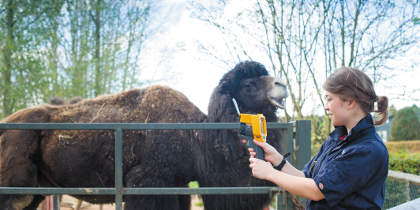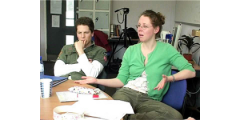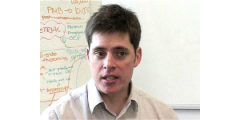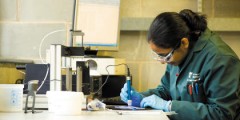Linking theory to practice in an undergraduate veterinary curriculum using case-based teaching: students’ perspectives
September 9, 2008
Hany Elsheikha: Background: “Case-based teaching (CBT) has been used extensively in medical and dental educational programs to develop critical thinking skills via a learner-centred approach. At the School of Veterinary Medicine and Science, University of Nottingham CBT was introduced as an ancillary teaching intervention to integrate clinically relevant material into the basic science component of …
Using problem-based learning in your teaching – advice for colleagues
March 15, 2008
Video >> Maggi Savin-Baden: “Start by saying it isn’t particularly new, lots of people assume immediately that it is something new and it’s, you know, all symbols and bright lights, but it isn’t really. “I mean it starts with the premise that people start learning through a problem situation of some description that is related to …
Using problem-based learning to develop critical thinking skills
Video >> Paul Garrrud: “Another benefit of the structure we have of working through a case in three group meetings, and obviously they do quite a lot of thinking and research out with those group meetings, is that it gives them an appreciation and some experience of clinical reasoning. “From the patient who walks in …
What do you need in a problem-based learning room
Video >> Kate: “We’re sitting in one of the Derby PBL rooms now – what are the special features about this kind of workspace?” Jonathan Ball: “I think the key elements are the fact that it’s very Arthurian, so there’s a round table and as a facilitator you’re certainly one of the group, rather than kind …
The problem-based learning cycle
Video >> Session 1 Pete Jennings: “PBL starts with session 1 – here at GEM it’s divided into 3 sessions. So session 1, the students come together, they’re presented with a trigger text which gives them enough clues to hopefully identify questions that they might have around certain topics.” Student group working Students: “Low energy …
An inverse method of teaching specialised subjects: decomposing a representative example to sustain analysis and interaction of details
January 16, 2007
Dragos Axinte: “The project discusses an example of teaching specialist manufacturing processes by identifying a ‘representative product’ (RP) from which key manufacturing processes can be isolated, analysed and interconnected to enable the understanding of how complex entities, i.e. products, are generated and made functional. “Teaching specialist manufacturing subjects is nowadays a challenge due to fast …






